Preventing Rain Damage To Your Home Or Business!
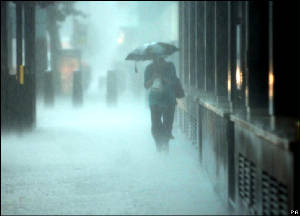 [Tue, June 28, 2011] The past four days brought some much needed rainfall and thunderstorms with portions of Broward and Miami-Dade
getting more than an inch and a half of rain. [Tue, June 28, 2011] The past four days brought some much needed rainfall and thunderstorms with portions of Broward and Miami-Dade
getting more than an inch and a half of rain.
To most of us rain is good
news as it provides some relief to the extreme drought conditions currently endangering South Florida, however to some of
us the thunderstorms and the heavy rain means leaking roofs, flooded basements and property damage. With more rain expected
this week in the greater Miami area, make sure that you take precautions to protect your home and personal belongings from
serious water damage. As property owner, please take the time to inspect the following frequently forgotten items:
- Any drains located around the home or in stair wells outside the home:
When debris, dirt or leaves cover these drains, they will not work as intended and they will cause water to back-up and possibly
rise high enough to flood your home. - Downspouts/Splash Blocks:
Make sure that your downspouts and splash blocks are attached properly and placed in such a manner that will deliver water
away from your home and not allow it to “pool” around your walls/foundation. - Gutters: Make sure that your gutters are free from debris that can cause them to clog. When water
can’t flow properly from the gutter to the downspouts, it will run over the edge of the gutter and cause water to fall
around your walls and foundation (this defeats the whole purpose of what your gutters are designed to do). ALSO, make sure
that your gutters are properly attached to your home. Over time, these can come loose from the side of the house and water
will not flow into the gutter properly. It will find its way in the space left between the house and the gutter and will drain
down and “pool” around the foundation. - Windows &
Doors: Inspect all your windows and doors for cracks in them, which are quite common for older homes, look for a
draft stopper which can prevent water, wind and cold weather from coming in through the cracks. This is an easy way to prevent
rain damage. Bring items that you leave outside inside for the time being if you do not want them to get wet or moldy.
One of the best ways to protect your financial future from rain damage is to invest in
adequate property insurance. If your home or business is ever damaged due to heavy rainfall, flooding or water damage, then
there is a good chance that your contents will be damaged as well. A leaking roof may damage your area rug while ruined foundation
may result in mould, mildew and water buildup. You could be looking at
damage to your kitchen cabinets, flooring, carpet, furniture, wall decal and anything else lying around. Rain damage will
often impact your basement or first floor which is often where people will store items and personal belongings.
Yes, the rain has started! But it’s never too late to take preventive measures
and review your policy! Get out there with your umbrella and inspect these areas as soon as possible. However, even the most diligent homeowner can suffer water damage in the event of a storm like
this. Because of that, make sure that you have reviewed your homeowner’s policy! Generally speaking, most homeowners
insurance and Water and Sewer Back-up coverage do not cover rising surface water that forces its way into your home from the
outside. That is considered to be a “flood”. If rising surface
water from a clogged drain, poor drainage, overflowing gutters etc… enters your home, you would need to have a separate
Flood Insurance policy to cover the resulting damage. These policies are available from your local insurance agent. The policies
have several restrictions and are not a guarantee of coverage in these situations. Therefore, the best thing to do is take
precautions before a loss occurs and contact a skilled Public Adjuster as soon as possible after damage occurs. I welcome
your comments and questions! Call me at 954-742-8248 or email at joe@florida-pa.com
Tue, June 28, 2011 | link
Question: I Looked At My Insurance
Policy And Mold Is Not Mentioned Once. What now? 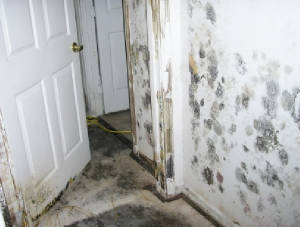 [Tue, June 21, 2011] The thought of having MOLD at home or office elicit fear and anxiety into the minds of those who’ve heard
horror stories about toxic health problems, expensive mold remediation services and denied homeowners insurance claims. [Tue, June 21, 2011] The thought of having MOLD at home or office elicit fear and anxiety into the minds of those who’ve heard
horror stories about toxic health problems, expensive mold remediation services and denied homeowners insurance claims.
Mold needs moisture to thrive. Issues most likely arise for property owners when the presence
of persistent moisture goes undetected or unresolved, leading to widespread mold intensification. Moisture can result from
high indoor humidity, flooding, a leaky kitchen appliance, poorly made building materials, water damage to rugs, etc. The standard HO-3 insurance policy does not cover mold. However, the presence of mold may be
covered if the contamination is the direct result of another covered peril. For
example, if a burst pipe or hailstorm led to water damage in your home that eventually resulted in the formation of mold,
then you may be able to file a reimbursable insurance claim. However, all insurance policies are different. As such, it is
recommended that you review the specifics of all coverable hazards for your policy. There may also be a mold exclusion clause
that details the level of mold coverage for which you qualify. It is therefore very important to correctly submit an insurance
claim, using appropriate language, proof and accurate terminology. Having a Public Adjuster represent you in such a claim
is strongly recommended in order to achieve fair and successful claim outcome. Insurance claims are more likely to be rejected if mold is caused by neglected home maintenance: long-term exposure
to humidity, inadequate or contaminated ventilation systems or repeated water leaks and seepage. About 22% of all homeowners insurance claims result from 'flood & water damage' a category that includes mold
remediation. There are a few states that are more prone to experience mold on account of their high humidity, high temperatures
and general dampness. According to the Insurance Information Institute, the average mold claim costs between $10,000 and $30,000 to handle. Therefore the risk for insurance companies is that the
mold is so tough and costly to remove. In a great number of cases the insurance company will argue that the consumer is to
be blame when there is a claim that involves mold. Painfully, the burden of proof will always be with the consumer. Be sure to contact a licensed Public Adjuster if you suspect any mold in your home or business.
Remember, it is in the financial benefit for insurance companies to deny or underpay your claim. After you report a claim
to your insurance company, they will send you an adjuster who represents them and their interests. Even if their adjuster
tells you that they are going to take care of you, they know what they have to do to minimize the amount paid out by the insurance
company. As a home or business owner, you are not familiar with your insurance
policy or the laws under which you have rights. A Public Adjuster will have access to the latest tools, software, experience
and skill needed to handle your claim and protect your home or business investments. A Public Adjuster stands on an equal
footing with the insurance company when it comes to the handling, preparation and presentation of your claim involving mold. As always, I welcome your comments and questions at joe@florida-pa.com
Tue, June 21, 2011 | link
New Hurricane Season, New Rules - Effective
June 1, 2011 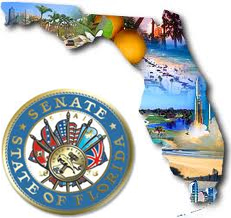 [Tue, June 7, 2011] Florida's property insurance bill SB 408 became law on May 17 upon the signature of Gov. Rick Scott, however certain provisions of the bill became effective on June
1 - the official start of Florida's hurricane season. [Tue, June 7, 2011] Florida's property insurance bill SB 408 became law on May 17 upon the signature of Gov. Rick Scott, however certain provisions of the bill became effective on June
1 - the official start of Florida's hurricane season.
As reported by
Joan E. Collier of PropertyCasualty360.com, of particular interest are the changes to Florida Statute 626.854 stating that compensation for a "reopened or supplemental
claim may not exceed 20 percent of the reopened or supplemental claim payment." Also effective June 1st is the mandate that all claims arising from a windstorm or hurricane must be filed "within
3 years after the date the hurricane first made landfall or the windstorm caused the covered damage."
Prior to the recent provisions, such claims could be filed with insurance carriers up
to 5 years after the event. The 5-year time-frame received significant attention following Hurricane Wilma and Katrina. To read the full report "Several Provisions in Florida’s SB 408 Effective June 1",
please click here. Interested on hearing your comments on the SB 408 provisions. Contact me by email at joe@florida-pa.com or call me at 954.742.8248.
Tue, June 7, 2011 | link
2011 Tornado Season Shaping Up To Be One
Of The Worst I Ever Seen 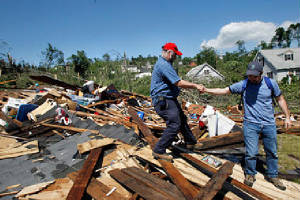 [Fri, June 3, 2011] Western and Central Massachusetts were hit with tornadoes and strong thunderstorms Wednesday evening, creating significant
damage to homes and property, striking an area of the country that rarely sees such severe weather conditions. [Fri, June 3, 2011] Western and Central Massachusetts were hit with tornadoes and strong thunderstorms Wednesday evening, creating significant
damage to homes and property, striking an area of the country that rarely sees such severe weather conditions.
This is the fourth consecutive year thunderstorm and tornado losses are reaching record levels
in my opinion, and it is imperative that property owners are adequately insured and properly prepared in case a disaster strikes.
Typically damage from a tornado is considered wind damage, and is covered
by standard homeowners, condo or renter's insurance policy. However, some policies might have a higher deductible for damage
done by wind or hail than other kinds of damage. Severe weather events
such as tornadoes can result in significant property damage. Structural damage can take many
forms – some are
obvious and others are less visible, therefore it is important to hire a professional Public Adjuster to assess the damage
and adjust the claim. An insurance loss involving a tornado –
results in very strong winds. Even tornadoes that do not actually touch the ground often result in severe pressure to buildings.
Extreme winds can push and pull on the buildings causing fasteners and building parts to become displaced. A detailed insurance
loss inspection by a licensed Public Adjuster is crucial. Many policyholders take the insurance company adjusters opinion,
without considering an independent appraisers opinion. This should just not happen. Contact me if you have questions regarding property damage claims, would like additional information about tornado damage or to set
up a free consultation. Remember, as a Public Adjuster, I always represent you - the property owner and ensure that you receive
a maximum settlement per your policy in order to rebuild!
Fri, June 3, 2011 | link
For Hurricane Season, Insurance Preparedness
Should Be a Part of Your Disaster Plan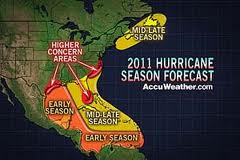 [Wed, June 1, 2011] June 1st marks the official start to the 2011 Atlantic Hurricane Season. While the tropics are relatively quiet
today, this is the time of the year that we start to watch storms spin across the Atlantic and wonder if our homes will be
in their path. [Wed, June 1, 2011] June 1st marks the official start to the 2011 Atlantic Hurricane Season. While the tropics are relatively quiet
today, this is the time of the year that we start to watch storms spin across the Atlantic and wonder if our homes will be
in their path.
Many Florida residents know the annual drill: plan for
a possible evacuation, stock up on food and water, and have a "go" kit ready with key documents, batteries, medicine,
cash and so on. But it's not all about the supplies you add to your hurricane
kit, you need to double check your homeowners insurance policy to make sure you have enough coverage and ensure that the policies
are not only up to date, but up to par - just in case a major storm hits. Homeowners
insurance can be tricky and depending on which company and policy you choose, the unknowing consumer can be left out to dry.
Once basic supplies are secured and stored for the storm, begin a review of your insurance coverage. Does it cover flood or
wind damage? Does it take into account current market value to rebuild your home or business? What is required of you under
"Duties after Loss"? Failure to follow the provisions here could result in denied claim by your insurance carrier.
Carefully review all exclusions and provisions which may have been recently
added to your policy which may affect the degree of your protection against property damage. Take inventory of all expensive
items in your home or business, keep receipts and recent photographs in a safe, water proof place. Home insurance policies can provide coverage for replacement cost or actual cash value in case of a loss. Policyholders
should be aware of their coverage type. Actual cash value is the amount it would take to repair damage to a home or to replace
its contents after allowing for depreciation. Replacement cost is the amount it would take to rebuild or replace a home and
its contents with similar quality materials or goods, without deducting for depreciation. In the unfortunate event of property damage due to a hurricane, call a licensed and experienced public adjuster before
authorizing any repair work, and be wary of any remediation contractors who recommend immediate work beyond necessary structural
repairs. Should you have any questions or comments, please don't hesitate
to contact me at joe@florida-pa.com
Wed, June 1, 2011 | link
|